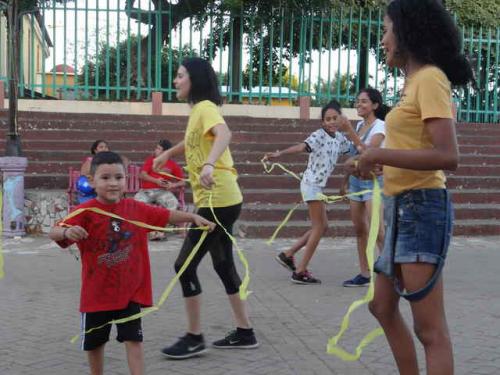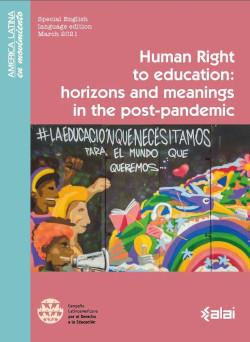Public education: our banner
The period of the pandemic has brought to the attention of all those willing to see them, the enormous debts that our States owe to education.
- Opinión

| Article published in ALAI’s magazine No. 551: Human Right to education: horizons and meanings in the post-pandemic 05/03/2021 |
For nearly twenty years, CLADE has raised the banner of public, free, secular, relevant, inclusive and lifelong education. We are aware of the multiple cracks, inequalities, inequities and absences of public education in most of our region, but we also know that it is there, in public education, that it is possible to ensure the full exercise of the human right to education for all. The period of the pandemic has brought to the attention of all those willing to see them, the enormous debts that our States owe to education. It has cruelly shown us the deep gaps between the rural areas and the cities, between girls and boys, between socio-economic levels, between whites, mestizos, indigenous people and people of African descent, not to mention the class divides that historically cut across our societies. Similarly, this period has allowed us to observe new nuances and situations about which it is necessary to warn and act decisively and quickly:
More than 160 million students have interrupted their educational courses in our region. The figure is scandalous and the reasons are multiple, but it is clear that, after decades of advancing in overcoming it, we are now once again facing a gap in access to education at all stages and cycles. Rapid recovery to pre-pandemic levels of access, in safe and adequate conditions, is urgent.
One of the factors which has had a strong impact on this situation is the so-called digital divide which, moreover, has shown us its various faces: that of access, that of connectivity, that of the absence of free public internet services, that of the lack of sufficient devices in families. But also, that of the limitations in knowledge and the difficulties in handling technology and virtual tools in large sectors of our societies. Alternatives for access, connectivity and use of the internet are indispensable.
The working conditions of our teachers have deteriorated and become more precarious. More working hours, with minimal infrastructure and training, often using their own economic resources. Time overloads, especially for women, divided between their teaching and their domestic work. Unemployed teachers due to reduced education budgets. Decent conditions and comprehensive training for our teachers are necessary.
A decrease in public education budgets, which were already insufficient. ECLAC estimates that there are around 9% less budget resources available for education, giving rise to a scenario of austerity, debt and cutbacks, which must be resisted and clear alternatives proposed. Tax justice and monitoring of investment in education are such clear alternatives.
New models of privatization and business that are expressed by families looking for solutions so that their children can continue studying, teachers paying for the internet to be able to give their classes, private foundations offering standardized educational packages, among others. Creative proposals for responses from public education policies are essential.
Public education is today more threatened than ever and CLADE is raising this banner higher than ever.
Facing the emergency: intersectionality and integrality
In each person or more precisely, in each body, multiple discriminations, violence and inequalities intersect. Gender, place of origin, disabilities, socio-economic status and even age, make up complex exclusions in the face of which the voices of indigenous peoples, migrants, people of African descent, women and LGBTIQ people rise up from all corners of the continent demanding education policies committed to overcoming all these forms of oppression/exclusion. Public education systems that work from and with differences and that overcome and help us to overcome, from the outset, the colonial, patriarchal and racist matrices that are functional to a perverse economic model.
Meanwhile, today, more than ever, it is necessary to actively participate in the design and implementation of comprehensive and safe plans for a return to school, from early childhood to higher education, without forgetting of course the response to the educational needs of young people and adults. This will only be possible by listening to the voices of the legal subjects themselves, that is, children, adolescents, their families, teachers, young people and adults who demand learning opportunities. In each case according to their needs, their contexts, their demands.
Education is in a state of emergency, but it is no good responding to it just anyhow, nor with "more of the same". This is key at all levels and stages, starting from early childhood, through youth, adults – all levels that have been addressed from their specificities in our discussions.
It is true that we are in a state of emergency and it is perhaps precisely for this reason that the responses must be collective, comprehensive and intelligent.
The virtual and education: the Internet as a free/open public good
Here a debate and a complex problem arise for the full exercise of the human right to education. Not that it did not already exist, but it had not been given the relevance it has. In our reflections, we have emphasised the need to democratise the internet, to define it as a right and as a public good. At the same time, we are not indifferent to the reflection on how to guarantee this connectivity without handing over our information, this precious commodity, to the large technological corporations, which already feed their business models thanks to precisely this, our information. Thus, the proposal of public virtual platforms, of digital sovereignty, of data protection, of technological autonomy, is gaining ground in our agenda.
On the other hand, a new form of literacy is on our horizon: digital literacy, that of algorithms... always with a critical and transforming perspective, so that our teachers take over the technology and make it one more tool for the transformative processes of our reality for which we will continue to fight.
All rights for all people: intersecting our struggles
Once again, we have shown that multiple rights converge in the human right to education. It is an enabling right but it is also a synergistic right. When educational institutions were closed, millions of children were left without food, for example. And now that safe return is being considered, in many places it is not possible, because there is no clean water, for example. Our struggle for educational change goes beyond the specific field and is articulated with much broader, strategic, political struggles.
We are called upon and committed to interlinkage, to knotting ourselves together and becoming entangled with movements, collectives, organizations and their agendas of struggle, with an inter-sectoral and also global perspective, which unites us with the entire Global South, at an timely historical moment for not returning to normality... in order to construct another reality which we had better not call normality... in this way we avoid, from the outset, the binaries to which this system has accustomed us.
(Translation ALAI)
Nelsy Lizarazo is General Coordinator of CLADE. She is a people’s educator and communicator. Member of the International News Agency for Peace and Nonviolence-PRESSENZA.
Introductory article to the 551st edition (December 2020) of ALAI’s magazine América Latina en Movimiento, entitled: Derecho Humano a la Educación: horizontes y sentidos en la post pandemia (Human Right to Education: horizons and meanings in the post-pandemic period), a co-edition ALAI / CLADE, to be published in English shortly.
Del mismo autor
- Racismo y discriminación explícitos contra presidente de la CONAIE 07/07/2021
- Derecho Humano a la Educación e Internet 10/06/2021
- Public education: our banner 12/02/2021
- Educación pública: nuestra bandera 11/12/2020
- Assange: el Estado ecuatoriano actuó sin garantizar el debido proceso 12/04/2019
- Assange: the Ecuadorian State acted without guaranteeing due process 12/04/2019
- Montserrat Boix: el lugar de la mujer en internet y Wikimujeres 11/10/2017
Pandemia
- Gabriela Ramírez Mendoza 07/02/2022
- Jyotsna Singh 06/02/2022
- Gabriela Ramírez Mendoza 06/02/2022
- Richa Chintan 10/01/2022
- Isaac Enríquez Pérez 03/01/2022

